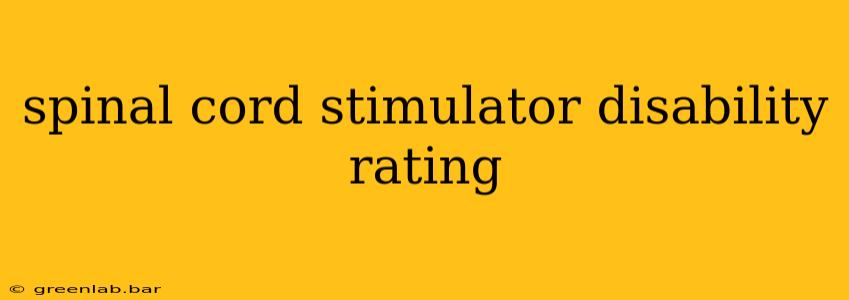Receiving a disability rating for a condition like chronic pain often involves navigating complex medical and legal processes. This guide will explore the factors influencing the disability rating associated with a spinal cord stimulator (SCS), focusing on the US system, but offering insights applicable internationally. Understanding this process can empower individuals seeking benefits and support.
Understanding Disability Ratings and the Role of an SCS
Disability ratings are determined by the severity of your impairment and its impact on your ability to perform daily activities. A spinal cord stimulator is a medical device implanted to manage chronic pain, often related to conditions like failed back surgery syndrome, peripheral neuropathy, or spinal stenosis. The presence of an SCS itself doesn't automatically guarantee a specific disability rating. Instead, the rating depends on several crucial factors:
Key Factors Affecting Your Disability Rating
-
Diagnosis and Severity of Underlying Condition: The primary diagnosis driving the need for an SCS heavily influences the rating. A more severe and debilitating underlying condition (like severe peripheral neuropathy causing significant functional limitations) will generally lead to a higher rating than a milder condition.
-
Effectiveness of the SCS: Crucially, the success of the SCS in managing your pain significantly impacts your disability rating. If the SCS provides substantial pain relief and improves your functional capacity, allowing you to perform more daily activities, your rating might be lower than if the device offers minimal relief. Documentation demonstrating the device's efficacy is essential.
-
Functional Limitations: This is arguably the most important factor. A detailed assessment of your limitations in performing daily activities (dressing, bathing, working, socializing) is paramount. Provide specific examples and quantify your limitations – e.g., "Unable to walk more than 50 feet without significant pain," or "Requires assistance with all personal care tasks."
-
Medical Documentation: Comprehensive and well-organized medical records are indispensable. These records should include detailed descriptions of your symptoms, the effectiveness of the SCS, and the impact of your condition on your daily life. Include results from nerve conduction studies, imaging (MRI, CT scans), and pain assessments. Your physician's opinion on your functional limitations is particularly crucial.
The Evaluation Process: Navigating the System
The evaluation process varies depending on the disability system (Social Security Disability Insurance (SSDI) in the US, for example). Generally, it involves:
-
Application: Completing a detailed application form accurately and thoroughly.
-
Medical Examination: An independent medical examination (IME) may be required to assess your condition and functional capabilities.
-
Review of Medical Evidence: The agency reviewing your application meticulously examines your medical records and other supporting documentation.
-
Decision: Based on the evidence, a decision is made regarding your disability claim and the resulting rating. Appeals processes exist if you disagree with the initial decision.
Maximizing Your Chances of a Favorable Rating
-
Comprehensive Medical Documentation: Maintain detailed medical records, including regular pain assessments and functional limitation reports.
-
Detailed Application: Thoroughly and accurately complete the disability application form, providing ample details about your limitations.
-
Seek Expert Assistance: Consider seeking help from a disability lawyer or advocate experienced in handling cases involving SCS implantation. They can navigate the complex process and ensure your claim is presented effectively.
-
Consistent Treatment: Adherence to your treatment plan, including regular follow-ups with your physician, demonstrates your commitment to managing your condition.
Disclaimer:
This information is intended for educational purposes only and should not be considered legal or medical advice. Always consult with healthcare professionals and legal experts for personalized guidance on your specific situation. The disability rating process is complex, and individual outcomes vary. The details outlined here are general guidelines; specific requirements vary based on location and the relevant disability agency.

